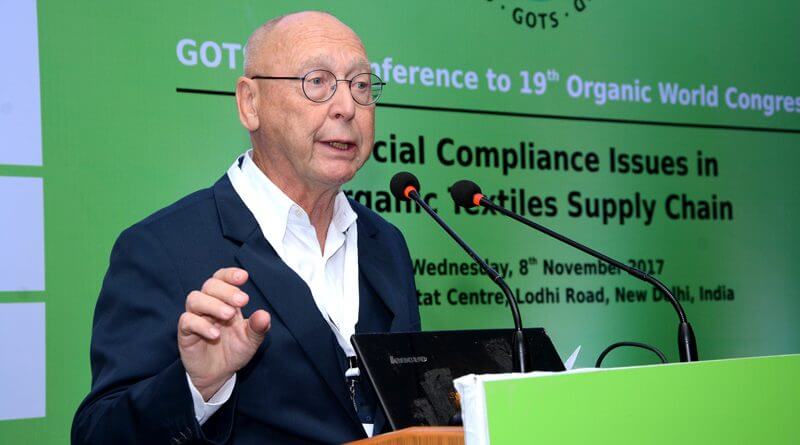GOTS Pre-Conference to IFOAM Organic World Congress – Hot Spots on Social Compliance
Prominent players from field of social compliance gathered at the conference and discussed shaping a future landscape for textile supply chains.
‘GOTS Pre-Conference to 19th Organic World Congress’ was organized by Global Organic Textile Standard (GOTS) in India Habitat Centre, New Delhi, India on 8th November, 2017. This conference was first of its kind, solely focused on theme ‘Social Compliance Issues in the Organic Textile Supply Chain’. It was attended by more than 85 high profile attendees from twelve countries. Attendees included CSR Managers of brands, HR Representatives, Certification Bodies, Standard Setters, Government, NGOs and other stakeholders from field of social compliance.
In his Welcome Address, Herbert Ladwig, Managing Director, GOTS spoke about importance of corporate social responsibility in businesses and gave a background on Social Compliance Requirements starting with the 8 fundamental conventions of the ILO, the UNHCR Guiding Principles, the OECD Guidelines and the more recent UN Global Compact principles. Ladwig further stated that there is a case for inclusion of social compliance rules into voluntary sustainability standards, such as GOTS, which remains a valuable contribution towards safeguarding the rights of people at the workplace.
Session 1: History and Overview of Social Compliances’
The session was moderated by Herbert Ladwig. The speakers were Joelle Katto- Andrighetto from IFOAM- Organics International, Germany and Dr. Elizabeth Bennett from Lewis & Clark College, USA.
Ms. Katto-Andrighetto informed the delegates about history of social standards, including ‘ethical trade standards’ of Soil Association, UK, which is one of the founders of GOTS.
She also mentioned that since year 2005, ‘Fairness’ has been included in the IFOAM ‘Principles of Organic Agriculture’ as one of the four principles. In conclusion, she called upon international stakeholders to work on issues of living wages, fair pricing and land grabbing together with IFOAM.
Dr Bennett in her presentation ‘Overview of Social Criteria in Sustainability Standards’ emphasised upon the importance of social criteria in voluntary standards. She suggested that improving wages – especially for low-wage earners with little wealth – is the key to improving income equality both within countries and globally. She further presented a study from comparison of twenty five standards that include social compliance. She asked all standards, including GOTS, to do more in areas of living wage, collective bargaining, inequality, etc. and bring in true sustainability.
Session 2: Challenges in Social Compliance
It was moderated by Christopher Stopes, GOTS Representative in UK. The speakers were Dr. Sandhya Barge, Global Living Wage Coalition, India; Simon Ferrigno, U.K. and Syam Sundar, ICEA, India.
Dr. Barge provided a definition for a Living Wage and spoke about the Anker Methodology for calculating living wage benchmarks. Furthermore, she provided examples of benchmark studies in Dhaka, Bangladesh and Tiruppur, India.
Ferrigno spoke on the burning issue of ‘Land Grabbing’. Simon noted that this problem is not specific to organic fibres or cotton cultivation. His talk showcased the importance of due diligence and gave some positive examples like OECD, Global Reporting Initiative, French corporate governance law, UK Modern slavery Act, etc.
Syam spoke on ‘Dealing with Non-Compliances in Social Aspects’, which was aimed at discussing challenges faced by certifiers, working in field of social audits. Some of the common issues were noted as migrant labour, seasonal work, Forced over time, adolescent work force, fire safety etc. He also shared some informative images from the audits that gave an actual idea of challenges faced by workers as a part of their daily lives at workplace.
Session 3: Beyond Certification
Session was moderated by Rahul Bhajekar, Director Standards Development & Quality Assurance, GOTS
In part 1 of the session, Tim Zahn, NGO Coordinator in the German Partnership for Sustainable Textiles, Germany and Avedis Seferian, Worldwide Responsible Accredited Production (WRAP), USA debated the topic ‘Is Certification Outdated?’.
Zahn analysed the motivational structures behind social audits and argued that the current system where auditor is paid by the auditee is flawed and not well suited to reveal social non-compliances. Lastly, he spoke about wages, social dialogue and aspirations of the workers where he felt that certification failed to do much as it only
works as a diagnostic tool. Supply chain transparency was identified as an aspect where certification systems can add value.
Seferian countered by pointing out the importance of certification and explained the difference between a standard and certification. He gave several examples of professions where payment is done by beneficiaries and contended that this is an established international practice. He also explained that the certification can be performed only against a measurable and auditable standard and is not designed to address aspirations. Seferian did acknowledge that certification is essentially a diagnostic tool but is necessary to know where we stand, so that progress can be made and that certifications & audits would never be outdated.
In the discussions that followed this debate, some common ground was noted such as the need for long term commitments within the supply chains; using constructive criticism for improvement; collaborations and encouraging trust in the partners.
The second part of the session was a Panel Discussion on ‘Initiatives Beyond Certification for Social Compliances in Textile Supply Chain’. The panellists were Devhuti Bakshi, Trident Limited, India and Saurabh Gupta, AEON Commercial Pvt Ltd, India.
Bakshi informed about Trident philosophy that entire ecosystem of social working has to be addressed. She spoke about some of their wide ranging initiatives that go beyond certification.
Gupta spoke about initiatives by AEON where they have been supporting their clients with detailed technical support thereby working beyond certification. He suggested that buyers should incentivize the suppliers with higher level of compliance.
Session 4: Besides Certification
It was moderated by Claudia Kersten, Director Marketing & Finance, GOTS. The speakers were Mumin Can Eker, Egedeniz Textile, Turkey; Archana Panda, Social Accountability International (SAI), India and Mr. A. Narayansamy, Armstrong Spinning Mills (P) Ltd, India.
Eker connected with the audience through a recorded video presentation, which gave details about living wage project in their company. The video included worker interviews, tour of the company and a lecture by Ekar.
Panda explained the Social Fingerprint® program, which helps companies measure and continually improve their social performance. SAI has developed several versions of Social Fingerprint in order to target all levels of the supply chain, including brands, licensees or vendors, and facilities.
Narayansamy spoke about Social Compliance Management System with examples from his own organisation. He explained the functioning of Workers Committees, how representation to such are made equitable; other activities towards workers empowerment and a unique supervisory development programme that they operate for migrant workers.
While Summing up, Mr. Herbert Ladwig informed delegates that GOTS will put forth outcomes of this conference to the 19th Organic World Congress (OWC). He suggested the following as major outcomes of the conference:
- Social criteria in sustainability standards help improving working conditions. Improve standards with measurable criteria and keep inspection/ certification as a diagnostic
- In addition, or – if possible – in combination find and apply suitable aspirational approaches and
- Find and apply efficient means to draw the big brands and retailers into utilizing their responsibility for sustainability of the textile
The suggestion was unanimously endorsed by attending delegates.
The outcomes from the conference were presented in Track 7.A of 19th Organic World Congress (OWC) by Christopher Stopes and Miyoshi Satoko, GOTS representative in Japan.
Dr. Elisabeth Bennett, Assistant Professor of International Affairs from Lewis & Clark College (Portland, Oregon, US) said: “The GOTS Pre-conference offered an important opportunity for supply chain actors, scholars, and sustainability advocates to discuss the most challenging problems and important opportunities in sustainability certifications for textile manufacturers. Perhaps most importantly, there was a robust discussion about the value of offering living wages to factory workers.”
“The inclusion of social compliance rules into voluntary sustainability standards with their system of inspection and certification – such as GOTS – is still and will remain a valuable contribution to safeguarding the rights of working people. We are pleased that our stakeholders very openly shared their views and suggestions for the further development of GOTS”, said Herbert Ladwig, GOTS Managing Director.
ABOUT GOTS: GOTS is the stringent voluntary global standard for the entire post- harvest processing (including spinning, knitting, weaving, dyeing and manufacturing) of apparel and home textiles made with organic fibre (such as organic cotton and organic wool), and includes both environmental and social criteria. Key provisions include a ban on the use of genetically modified organisms (GMOs), highly hazardous chemicals (such as azo dyes and formaldehyde), and child labour, while requiring strong social compliance management systems and strict waste water treatment practices. GOTS was developed by leading international standard setters – Organic Trade Association (U.S.), Japan Organic Cotton Association, International Association Natural Textile Industry (Germany), and Soil Association (UK) – in order to define globally-recognized requirements that ensure the organic status of textiles. For more information on the Global Organic Textile Standard, please see www.global-standard.org

